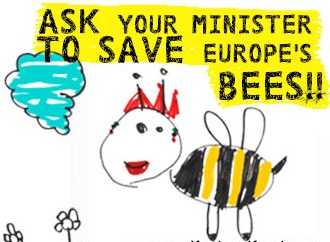The EFSA (European Food Safety Authority) has today issued a press release identifying yet another insecticide that presents a high risk to honeybees. The report, requested by the European Commission, follows a previous risk assessment published in January this year identifying three pesticides (all neonictonoids) scientifically-proven to be harmful to bees.
The publication of these findings in January led to the Commission proposing a partial 2-year ban on the use of these substances. However in the first vote on the proposed ban, held in March 2013, many Agricultural Ministers did not support it, with the outcome being seen as inconclusive.

After weeks of campaigning and civil society pressure on Agricultural Ministers, during the second vote in April, 15 EU Member States voted in favour of the ban, enabling the Commission to go ahead with it.
The pesticide identified in today’s report is called fipronil. EFSA has concluded that fipronil, produced by German chemical company BASF, poses a “high acute risk to honeybees when used as a seed treatment for maize”.
Reacting to the ban, Greenpeace EU agriculture policy director Marco Contiero said: “The fact that fipronil and other pesticides toxic to bees were authorised at all shows that EU safety testing is in dire need of an overhaul. These pesticides have been building up in our environment for a decade, so limited, temporary bans won’t be enough to give bees a breather, particularly while other similar chemicals are still being used. The Commission should develop a comprehensive plan for the protection of insect pollinators, starting with a solid ban on fipronil and other bee-harming substances.”
ARC2020 will also be watching this development closely, both in the Commission, but also Europe’s farm ministers to see how they will act on this new information.





1 Trackback / Pingback
Comments are closed.